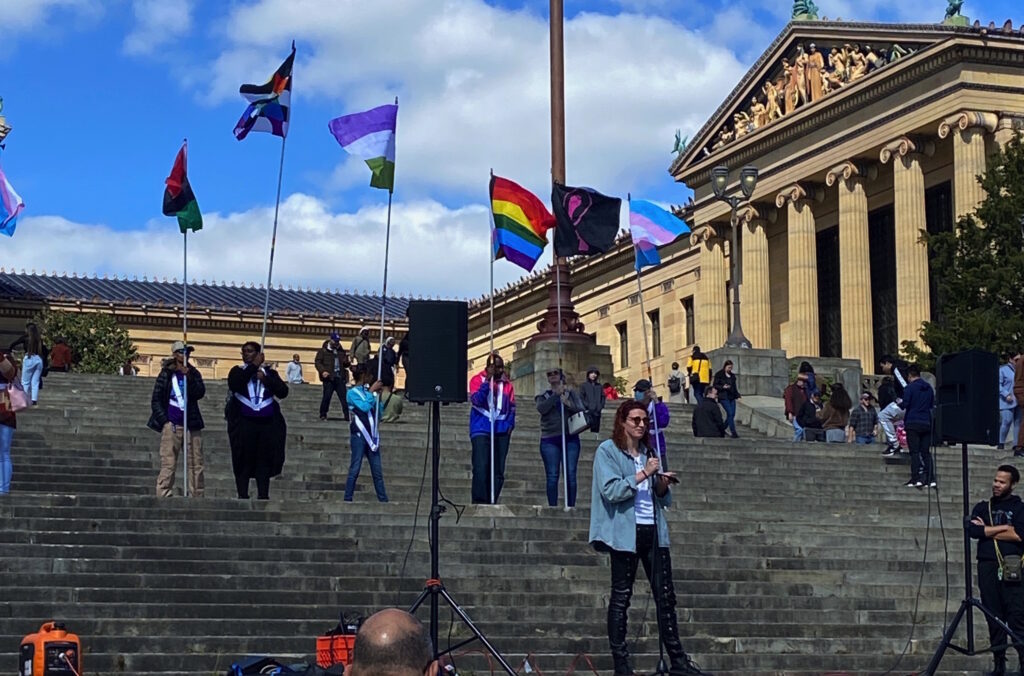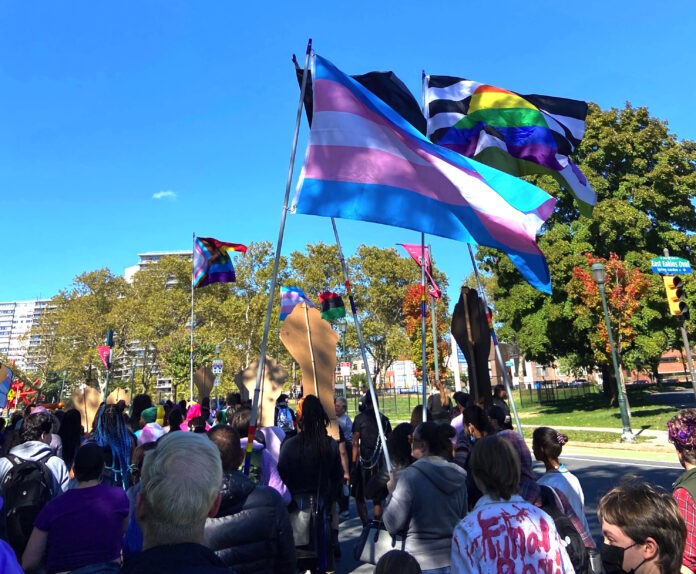“Anti-trans legislation is a direct attack on our siblings and their ability to participate in a world that is largely falsified,” D’Auriel Epiphany said at the 2022 Philly Trans March (PTM). Epiphany started the local queer skate group Rolling with the Homos. “The rules are made up; it is all about telling us how we are supposed to live, exist, love, learn. That is the complete opposite of what we need in order to come together and change what is actually important.”
The annual trans march took place on Saturday, Oct. 8 on the steps of the Philadelphia Museum of Art (PMA). Roughly 100 to 150 people gathered to speak out for trans rights in multiple areas. Considering the plethora of legislative attacks targeting trans youth, including bills designed to ban trans students from participating in school sports, the theme of this year’s march was celebrating trans and nonbinary youth in athletics.
Jaxin Jackson, a comedian, actor, writer and arts educator, emceed the speaking portions of the march, which included remarks from Epiphany; swimmer and recent University of Pennsylvania graduate Lia Thomas; Philly drag performer Marcha Pisces; Ant Smith, an educator and organizer who works with Food Not Bombs Solidarity, as well as one of his students; Alexa Vallejo, a Philadelphia Museum of Art (PMA) employee who is protesting the museum’s unfair policies as part of the PMA union; wrestler and trans rights activist Mack Beggs; and B.J. Bryant, board member of the Delawarey County activism group U.D.T.J., whose mission is to “fight for equality and justice based on race, gender identity, sexual orientation and across all intersectional identities.” A nonbinary Lenape child also spoke about the futility of the gender binary and the perils of perpetuating a colonialist narrative.
When Thomas addressed the crowd, they talked about the challenges they faced as a trans person and an athlete, navigating the two most important parts of who they are. But they also acknowledged their privilege in having a support system along the way.
“Not everybody has that support network to help them and to allow them to achieve their dreams in whatever aspect that is,” Thomas said at the march. “I want to acknowledge that these state legislators who continue to pass just incredibly cruel and transphobic bills that are often only targeted towards trans children, preventing them from competing and doing sports with their friends and peers — it’s unjust and it’s very wrong. But I have faith that as a community we will come together and we will fight this.”

The speakers at the march addressed issues beyond attacks on trans youth in sports. Bryant of U.T.D.J talked about how dangerous Philadelphia’s surrounding counties are for trans youth, specifically Delaware County.
“Living in Delco, I’m terrified for our trans youth,” Bryant said at the march. “There aren’t any resources in schools, libraries, or any public places that I know of where they can go to not only see information, but get necessary care. Even as an adult it is a struggle to find LGBTQ+ bars and Delaware County gender affirming care and trans-friendly housing. As the years go by, I see little to no improvement on these issues. Delco needs your help; we definitely can’t do this alone. They have completely erased the trans community in Delaware County.”
Bryant also announced the first trans march to take place in Delaware County in March, 2023.
“It is time for Delco to realize that the trans community is not going anywhere and they do not get to erase us.”
Transphobia and homophobia are major problems in Philadelphia’s collar counties. Board members in Springfield School District recently communicated anti-trans ideas on a public radio show, and board members in Central Bucks School District (CBSD) have cultivated a toxic environment for queer and trans students by implementing anti-LGBTQ policies, policies for which the ACLU recently filed a federal complaint against the CBSD.
“While Philly has a lot of inclusion, there’s a lot of gentrification and a lot of people being pushed out and forced to move into these counties,” PTM organizer Bri Golphin told PGN. “When they live in these counties, they don’t have the same amount of resources or the same type of community that Philly has.”
During the march, which was bookended by speakers, attendees walked down the streets of Fairmount calling for trans liberation and the need to fight oppressive systems that attack trans people. Tatyana Woodard, who works at Mazzoni Center and co-leads the trans-centric housing initiative Ark of Safety, took part in leading the call and response chanting at the march.
Lou Mrtin, a trans youth who was at the march, said that they did not have much in the way of support in their small, conservative town. They told PGN that one of the best ways to be an accomplice to trans youth is to “support the youth, listen to what youth have to say — whether you’re in the community or not. It’s not easy as a trans youth; it’s not easy as a trans youth of color. We need the support and we need the community. We need the ears to listen. If you have power, if you have privilege, use the opportunity. It’s your obligation.”
What stood out about this year’s march was that trans rights are being undermined in so many different facets of life. In addition to the legislative attacks, coverage of trans-affirming healthcare is on the line and is being denied to employees at Starbucks, the PMA, and other workplaces. Golphin addressed this issue by speaking on behalf of Workers United.
Vallejo of the PMA union started working at the musem before her transition and initially hesitated to come out at work due to the museum’s lack of queer-affirming culture, she said at the march. She was getting paid the lowest possible salary for her job, and the price of her healthcare coverage was through the roof.
“The heart of the matter is that we need more and better affordable health insurance,” Vallejo said at the march. “The plans the PMA offers are so expensive that they effectively lower our already low salaries. On this issue, the museum refuses to budge. Any attempt to curtail the accessibility of health care, either through eligibility requirements or cost, is inherently transphobic.”
Performer Marcha Pisces spoke about the injustices that she experienced as a former member of the PHL Pride Collective (PPC). She told the crowd that some members of PPC at the time wanted to plan Pride in what she called an unsafe location, as well as did not take into account accessibility and safety for Black and Brown trans folks. Pisces also critiqued the tactics PPC used at the time against those the group disagreed with. After her speech, Pisces performed a musical number in front of the crowd.
At the end of the march, Golphin read out PTM’s demands, which include the abolition of prisons and police; the decriminilization of all forms of sex work, drug posession, drug use and self defense; protections for people impacted by rates of deportation including migrants and their families; investment in transformative justice infrastructures including participatory defense, Black trans-centric housing, healthcare, and harm reduction in numerous forms; a stop to harassment, assault and murders that trans people continue to experience; economic justice in the form of hiring of trans people, creating safe workplaces and support for reparations of land and wealth to Black and indigenous Lenni Lenape trans people; community support for all direct actions including union support; the building of Black trans leadership and compensation within organizations that work for social change; safety and affirmation for trans students; the formation of a coalition in Philly and surrounding counties to fight state legislation that seeks to harm the trans community; protection and enhanced resources for trans elders; that reparations be given to BIPOC trans people; that white folks, including white trans people, actively participate in anti-racism work; that voting be used as harm reduction (even though Golphin clarified that PTM is an abolitionist organization); that community leaders stop criminalizing PTM as an organization and that the Philadelphia Trans Wellness Conference, which is organized by Mazzoni Center, be restored to community control.
Golphin said that although this year’s trans march is over, that does not mean that the fight for trans rights and trans liberation ends here.
“The election is right around the corner and the work does not die,” Golphin told PGN. “Now’s not the time to stop working, because literally our lives are on the line – not just for trans youth but for everyone. When we’re talking among our peers and other folks in the trans community, attacking trans youth is the beginning. The next thing that we are suspicious of is that they’re going to come after our healthcare. By that I mean access to hormones or anything like that – that’s not going to be covered under the insurance if we were to have someone like Mastriano or Oz in power.”
